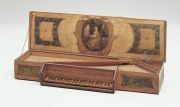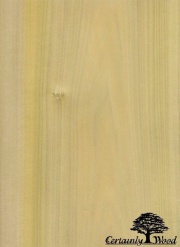Difference between revisions of "Poplar"
| Line 1: | Line 1: | ||
[[File:17.1791-SC14413.jpg|thumb|]] | [[File:17.1791-SC14413.jpg|thumb|]] | ||
== Description == | == Description == | ||
| − | + | [[File:poplarwc.jpg|thumb|White poplar (''Populus alba'')]] | |
Any of several hardwood trees from the genus ''Populus''. The trees are in the willow family and are found in temperate regions of the Northern hemisphere. There are four basic classes of poplar trees: | Any of several hardwood trees from the genus ''Populus''. The trees are in the willow family and are found in temperate regions of the Northern hemisphere. There are four basic classes of poplar trees: | ||
| Line 16: | Line 16: | ||
In general, poplar is a soft, lightweight wood that is easy to work. The wood has a fine, uniform grain but it is prone to warping. It is primarily used for paneling, light construction, packing crates, cardboard and paper pulp. Poplar was frequently used in Italian panel paintings and for sculptures in southern Germany in the late Gothic period. | In general, poplar is a soft, lightweight wood that is easy to work. The wood has a fine, uniform grain but it is prone to warping. It is primarily used for paneling, light construction, packing crates, cardboard and paper pulp. Poplar was frequently used in Italian panel paintings and for sculptures in southern Germany in the late Gothic period. | ||
| − | |||
== Synonyms and Related Terms == | == Synonyms and Related Terms == | ||
white poplar (''Populus alba''); peuplier (Fr.), chopo (Esp.); álamo (Esp.); choupo branco (Port.); pioppo (It.) | white poplar (''Populus alba''); peuplier (Fr.), chopo (Esp.); álamo (Esp.); choupo branco (Port.); pioppo (It.) | ||
| − | == | + | == Physical and Chemical Properties == |
| − | |||
| − | |||
| − | + | * Annual rings = well-defined. | |
| − | + | * Rays = fine | |
| − | + | * Density = 22-35 ppcf | |
| − | |||
| − | |||
== Additional Information == | == Additional Information == | ||
| − | + | * Schoch, W., Heller, I., Schweingruber, F.H., Kienast, F., 2004:[http://www.woodanatomy.ch/ Wood anatomy of central European Species]: White Poplar,[http://www.woodanatomy.ch/species.php?code=PPAL Populus alba L.] | |
== Resources and Citations == | == Resources and Citations == | ||
Revision as of 13:36, 30 June 2020
Description
Any of several hardwood trees from the genus Populus. The trees are in the willow family and are found in temperate regions of the Northern hemisphere. There are four basic classes of poplar trees:
1) Balsam poplar (cottonwood),
2) black poplar (English poplar),
3) white poplar (Populus alba)
4) Gray poplar
5) trembling poplar (Aspen)
In general, poplar is a soft, lightweight wood that is easy to work. The wood has a fine, uniform grain but it is prone to warping. It is primarily used for paneling, light construction, packing crates, cardboard and paper pulp. Poplar was frequently used in Italian panel paintings and for sculptures in southern Germany in the late Gothic period.
Synonyms and Related Terms
white poplar (Populus alba); peuplier (Fr.), chopo (Esp.); álamo (Esp.); choupo branco (Port.); pioppo (It.)
Physical and Chemical Properties
- Annual rings = well-defined.
- Rays = fine
- Density = 22-35 ppcf
Additional Information
- Schoch, W., Heller, I., Schweingruber, F.H., Kienast, F., 2004:Wood anatomy of central European Species: White Poplar,Populus alba L.
Resources and Citations
- R. J. Gettens, G.L. Stout, Painting Materials, A Short Encyclopaedia, Dover Publications, New York, 1966
- G.S.Brady, Materials Handbook, McGraw-Hill Book Co., New York, 1971 Comment: p. 629
- Hermann Kuhn, Conservation and Restoration of Works of Art and Antiquities, Butterworths, London, 1986
- F. H. Titmuss, Commercial Timbers of the World, The Technical Press Ltd., London, 1965 Comment: 25-35 ppcf
- Dictionary of Building Preservation, Ward Bucher, ed., John Wiley & Sons, Inc., New York City, 1996
- Pam Hatchfield, Pollutants in the Museum Environment, Archetype Press, London, 2002
- Encyclopedia Britannica, http://www.britannica.com Comment: "poplar" [Accessed November 7, 2001].
- CRC Handbook of Chemistry and Physics, Robert Weast (ed.), CRC Press, Boca Raton, Florida, v. 61, 1980 Comment: density=22-31 ppcf (0.35-0.50 g/cm3)

